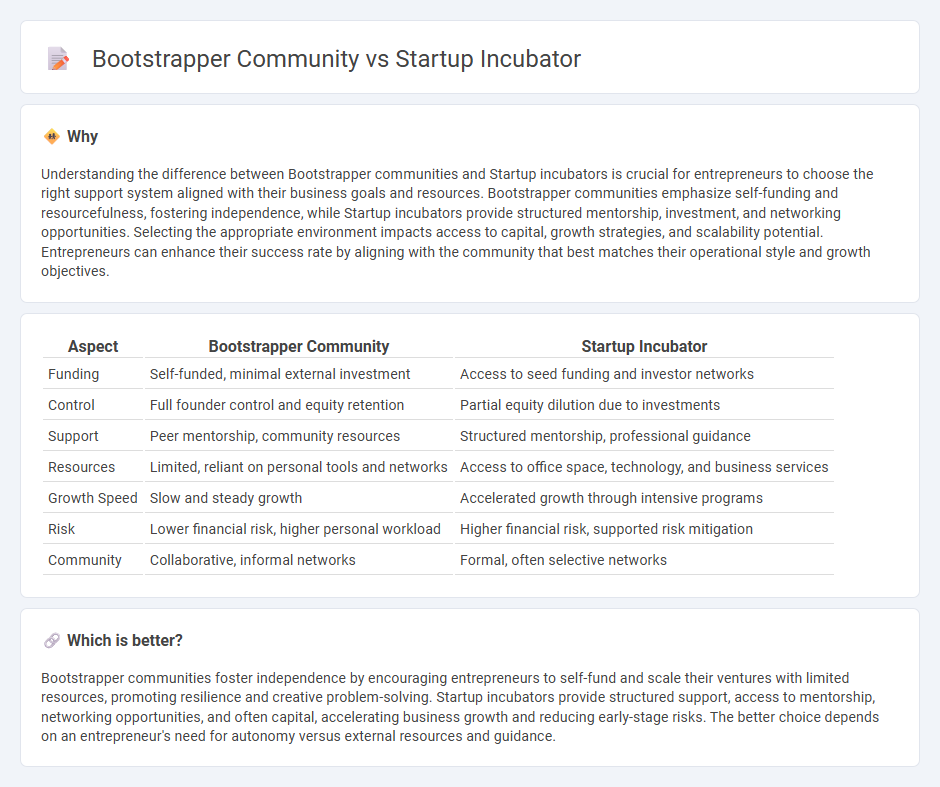
Bootstrapper communities emphasize self-funding and lean operations, enabling entrepreneurs to maintain full control while minimizing external dependencies. Startup incubators provide structured support through mentorship, resources, and networking opportunities, often exchanging equity or participation for these services. Explore more to determine which environment suits your entrepreneurial journey.
Why it is important
Understanding the difference between Bootstrapper communities and Startup incubators is crucial for entrepreneurs to choose the right support system aligned with their business goals and resources. Bootstrapper communities emphasize self-funding and resourcefulness, fostering independence, while Startup incubators provide structured mentorship, investment, and networking opportunities. Selecting the appropriate environment impacts access to capital, growth strategies, and scalability potential. Entrepreneurs can enhance their success rate by aligning with the community that best matches their operational style and growth objectives.
Comparison Table
| Aspect | Bootstrapper Community | Startup Incubator |
|---|---|---|
| Funding | Self-funded, minimal external investment | Access to seed funding and investor networks |
| Control | Full founder control and equity retention | Partial equity dilution due to investments |
| Support | Peer mentorship, community resources | Structured mentorship, professional guidance |
| Resources | Limited, reliant on personal tools and networks | Access to office space, technology, and business services |
| Growth Speed | Slow and steady growth | Accelerated growth through intensive programs |
| Risk | Lower financial risk, higher personal workload | Higher financial risk, supported risk mitigation |
| Community | Collaborative, informal networks | Formal, often selective networks |
Which is better?
Bootstrapper communities foster independence by encouraging entrepreneurs to self-fund and scale their ventures with limited resources, promoting resilience and creative problem-solving. Startup incubators provide structured support, access to mentorship, networking opportunities, and often capital, accelerating business growth and reducing early-stage risks. The better choice depends on an entrepreneur's need for autonomy versus external resources and guidance.
Connection
The Bootstrapper community and Startup incubators share a symbiotic relationship where bootstrappers leverage incubators for affordable resources and mentorship while maintaining lean operations. Startup incubators provide crucial support such as networking opportunities, early-stage funding access, and structured business development frameworks that align with the bootstrapper's goal of sustainable growth. This connection fosters innovation by combining the bootstrapper's self-reliant approach with the incubator's strategic guidance and infrastructure.
Key Terms
Mentorship
Startup incubators provide structured mentorship programs with access to experienced industry experts, tailored workshops, and networking opportunities designed to accelerate business growth. Bootstrapper communities, on the other hand, offer peer-to-peer mentorship and grassroots support, emphasizing cost-effective, self-driven learning and problem-solving. Discover how each approach can uniquely empower your startup journey.
Equity
Startup incubators often require equity stakes in exchange for funding, mentorship, and resources, aligning their success with the startup's growth. Bootstrapper communities typically avoid giving away equity, emphasizing independent growth through self-funding and peer support. Explore how these equity models impact startup control and long-term value creation.
Self-funding
Startup incubators provide structured programs, mentorship, and access to investor networks, accelerating early-stage development with external support. Bootstrapper communities emphasize self-funding, fostering resourcefulness and sustainable growth through personal investment and organic revenue generation. Explore the advantages of self-funding strategies and community-driven growth to determine the best fit for your startup journey.
Source and External Links
How a Business Incubator Program Can Help Your Startup Grow | CO - Startup incubators support early-stage startups by providing workspace, seed funding, mentoring, and training, helping them develop ideas, business models, and long-term strategies through an application and interview process.
Business incubator - Wikipedia - Business incubators help startups overcome initial hurdles by offering services including office space, funding, legal and accounting support, mentorship, marketing assistance, and access to investors and strategic partners.
Incubator vs Accelerator: Which Is Best for Your Startup? - J.P. Morgan - Incubators nurture startups from idea stage toward minimum viable products over months or years, providing non-dilutive funding and selective mentorship, contrasting with accelerators which focus on rapidly scaling startups with existing products and market fit.
 dowidth.com
dowidth.com